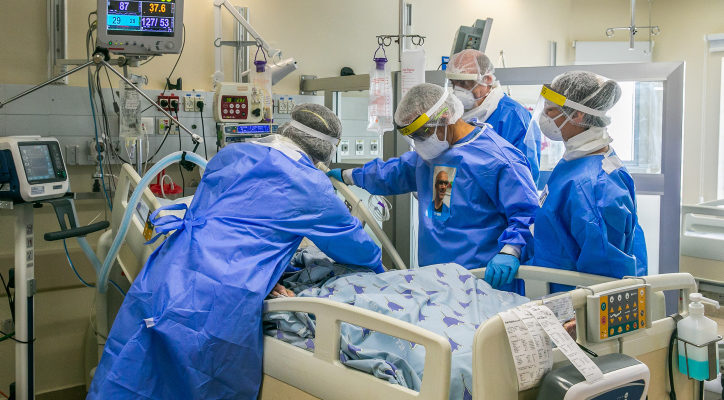Stanford University study shows problems in immune cells of those severely sick with coronavirus.
By World Israel News Staff
A study published Tuesday by Stanford University School of Medicine has shed light on why some people get really sick from coronavirus while others don’t.
Researchers found that what they call ‘immunological deviations and lapses’ appear to spell the difference between severe and mild cases of COVID-19.
The body’s innate immune system responds to SARS-CoV-2, the virus that causes the disease, by rapidly sensing virus and launching an immediate though somewhat indiscriminate attack on them. At the same time it mobilizes more precisely targeted, but slower-to-get-moving, “sharpshooter” cells belonging to a different branch of the body’s pathogen-defense forces, the adaptive immune system.
“These findings reveal how the immune system goes awry during coronavirus infections, leading to severe disease, and point to potential therapeutic targets,” said Prof. Bali Pulendran
The research team analyzed the immune response in 76 people with COVID-19 and in 69 healthy people, finding enhanced levels of molecules that promote inflammation in the blood of severely ill COVID-19 patients.
Three of those molecules have been shown to be associated with lung inflammation in other diseases but had not been shown previously in COVID-19 infections.
“These three molecules and their receptors could represent attractive therapeutic targets in combating COVID-19,” said Pulendran, whose lab is now testing the therapeutic potential of blocking these molecules in animal models of COVID-19.
The scientists also found elevated levels of bacterial debris, such as bacterial DNA and cell-wall materials, in the blood of those COVID-19 patients with severe cases. The more debris, the sicker the patient — and the more pro-inflammatory substances circulating in his or her blood.
Their findings suggest that in cases of severe COVID-19, bacterial products ordinarily present only in places such as the intestines, lungs and throat may make their way into the bloodstream, kick-starting enhanced inflammation that is conveyed to all points via the circulatory system.
But the study also revealed, paradoxically, that the worse the case of COVID-19, the less effective certain cells of the innate immune system were in responding to the disease. Instead of being aroused by material from viruses and bacteria, these normally vigilant cells remained functionally sluggish.
If high blood levels of inflammation-promoting molecules set COVID-19 patients apart from those with milder cases, but blood cells are not producing these molecules, where do they come from? Pulendran believes they originate in tissues somewhere in the body — most likely patients’ lungs, the site of infection.
“One of the great mysteries of COVID-19 infections has been that some people develop severe disease, while others seem to recover quickly,” Pulendran said. “Now we have some insights into why that happens.”





